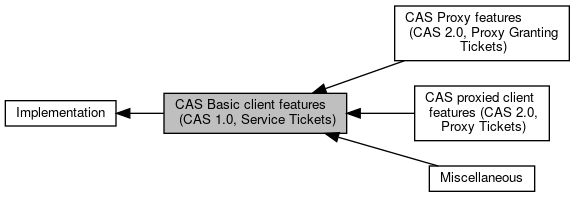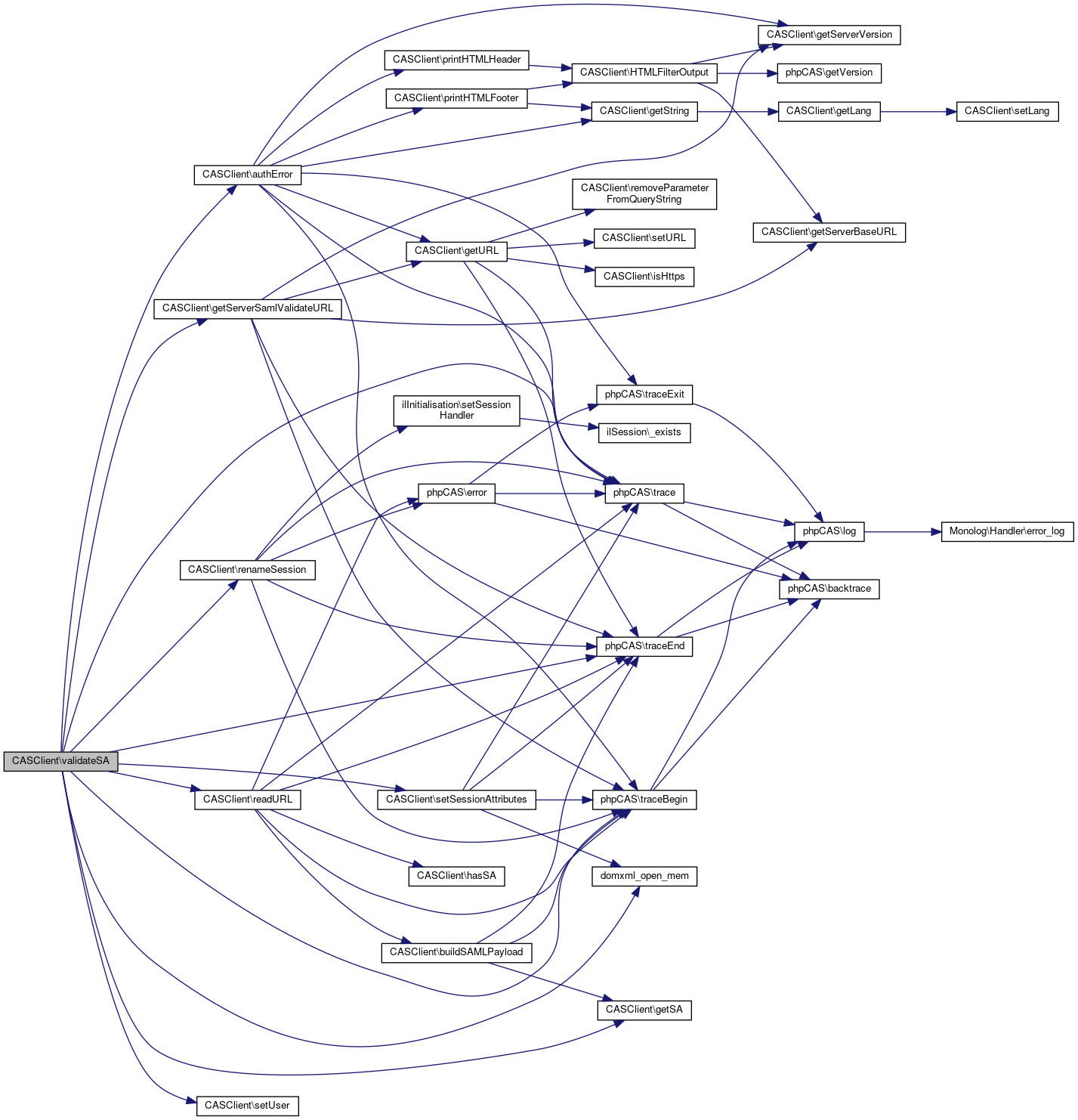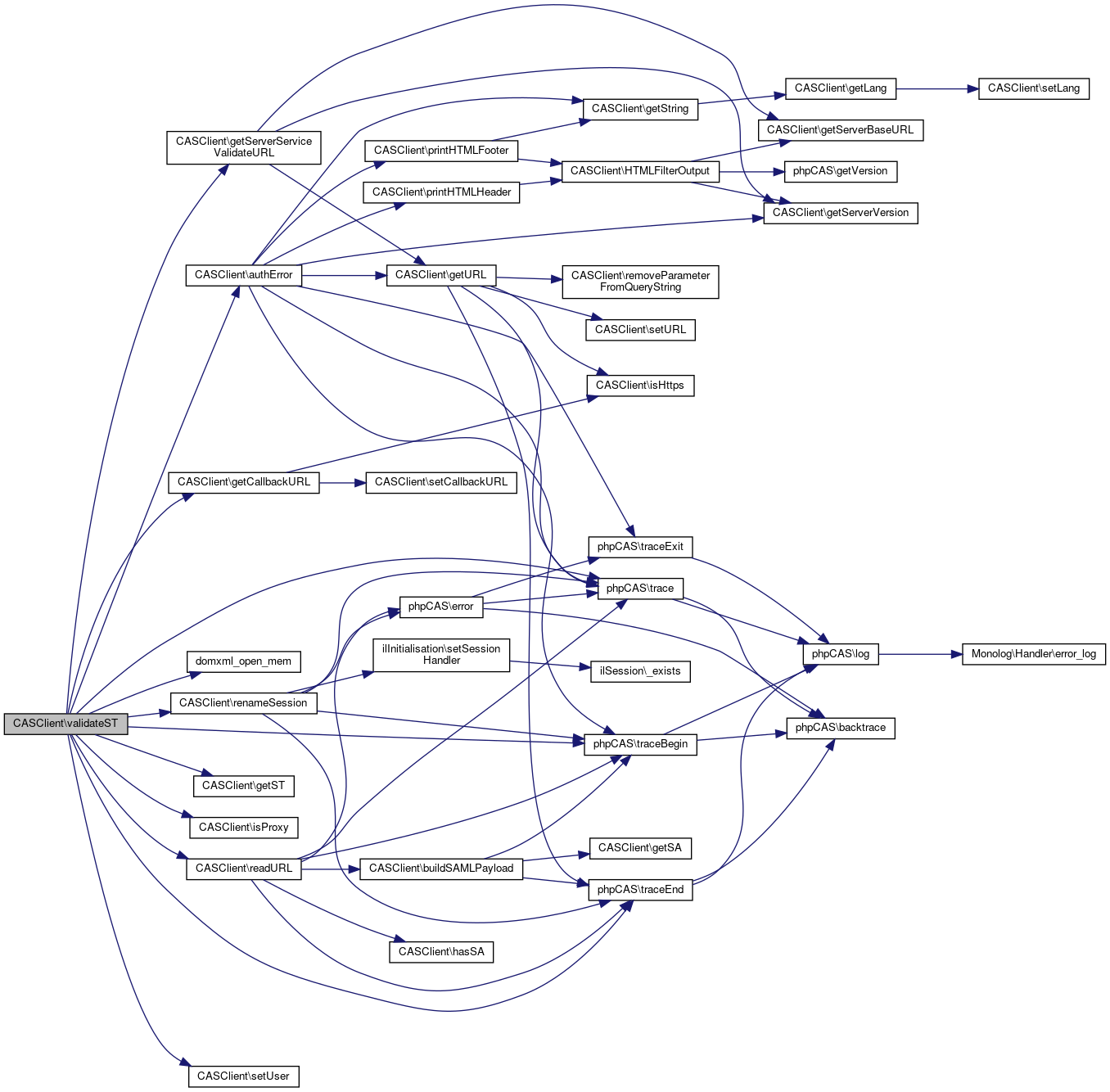 Collaboration diagram for CAS Basic client features (CAS 1.0, Service Tickets):
Collaboration diagram for CAS Basic client features (CAS 1.0, Service Tickets):Modules | |
| CAS Proxy features (CAS 2.0, Proxy Granting Tickets) | |
| CAS proxied client features (CAS 2.0, Proxy Tickets) | |
| Miscellaneous | |
Functions | |
| CASClient::getST () | |
| This method returns the Service Ticket provided in the URL of the request. More... | |
| CASClient::setST ($st) | |
| This method stores the Service Ticket. More... | |
| CASClient::hasST () | |
| This method tells if a Service Ticket was stored. More... | |
| CASClient::setCasServerCert ($cert) | |
| Set the certificate of the CAS server. More... | |
| CASClient::setCasServerCACert ($cert) | |
| Set the CA certificate of the CAS server. More... | |
| CASClient::setNoCasServerValidation () | |
| Set no SSL validation for the CAS server. More... | |
| CASClient::validateST ($validate_url, &$text_response, &$tree_response) | |
| This method is used to validate a ST; halt on failure, and sets $validate_url, $text_reponse and $tree_response on success. More... | |
| CASClient::validateSA ($validate_url, &$text_response, &$tree_response) | |
| This method is used to validate a SAML TICKET; halt on failure, and sets $validate_url, $text_reponse and $tree_response on success. More... | |
| CASClient::setSessionAttributes ($text_response) | |
| This method will parse the DOM and pull out the attributes from the SAML payload and put them into an array, then put the array into the session. More... | |
Variables | |
| CASClient::$_st | |
| the Service Ticket provided in the URL of the request if present (empty otherwise). More... | |
| CASClient::$_cas_server_cert | |
| the certificate of the CAS server. More... | |
| CASClient::$_cas_server_ca_cert | |
| the certificate of the CAS server CA. More... | |
| CASClient::$_no_cas_server_validation | |
| Set to true not to validate the CAS server. More... | |
Detailed Description
Function Documentation
◆ getST()
|
private |
This method returns the Service Ticket provided in the URL of the request.
- Returns
- The service ticket.
Definition at line 1298 of file client.php.
References CASClient\$_st.
Referenced by CASClient\isAuthenticated(), and CASClient\validateST().
 Here is the caller graph for this function:
Here is the caller graph for this function:◆ hasST()
|
private |
This method tells if a Service Ticket was stored.
- Returns
- TRUE if a Service Ticket has been stored.
Definition at line 1314 of file client.php.
Referenced by CASClient\isAuthenticated().
 Here is the caller graph for this function:
Here is the caller graph for this function:◆ setCasServerCACert()
| CASClient::setCasServerCACert | ( | $cert | ) |
Set the CA certificate of the CAS server.
- Parameters
-
$cert the PEM certificate of the CA that emited the cert of the server
Definition at line 1366 of file client.php.
◆ setCasServerCert()
| CASClient::setCasServerCert | ( | $cert | ) |
Set the certificate of the CAS server.
- Parameters
-
$cert the PEM certificate
Definition at line 1356 of file client.php.
◆ setNoCasServerValidation()
| CASClient::setNoCasServerValidation | ( | ) |
Set no SSL validation for the CAS server.
Definition at line 1374 of file client.php.
◆ setSessionAttributes()
|
private |
This method will parse the DOM and pull out the attributes from the SAML payload and put them into an array, then put the array into the session.
- Parameters
-
$text_response the SAML payload.
- Returns
- bool TRUE when successfull and FALSE if no attributes a found
Definition at line 1600 of file client.php.
References $_SESSION, $result, domxml_open_mem(), SAML_ATTRIBUTES, phpCAS\trace(), phpCAS\traceBegin(), and phpCAS\traceEnd().
 Here is the call graph for this function:
Here is the call graph for this function:◆ setST()
|
private |
This method stores the Service Ticket.
- Parameters
-
$st The Service Ticket.
Definition at line 1306 of file client.php.
Referenced by CASClient\wasPreviouslyAuthenticated().
 Here is the caller graph for this function:
Here is the caller graph for this function:◆ validateSA()
|
private |
This method is used to validate a SAML TICKET; halt on failure, and sets $validate_url, $text_reponse and $tree_response on success.
These parameters are used later by CASClient::validatePGT() for CAS proxies.
- Parameters
-
$validate_url the URL of the request to the CAS server. $text_response the response of the CAS server, as is (XML text). $tree_response the response of the CAS server, as a DOM XML tree.
- Returns
- bool TRUE when successfull, halt otherwise by calling CASClient::authError().
Definition at line 1522 of file client.php.
References domxml_open_mem(), phpCAS\trace(), and phpCAS\traceBegin().
 Here is the call graph for this function:
Here is the call graph for this function:◆ validateST()
|
private |
This method is used to validate a ST; halt on failure, and sets $validate_url, $text_reponse and $tree_response on success.
These parameters are used later by CASClient::validatePGT() for CAS proxies. Used for all CAS 1.0 validations
- Parameters
-
$validate_url the URL of the request to the CAS server. $text_response the response of the CAS server, as is (XML text). $tree_response the response of the CAS server, as a DOM XML tree.
- Returns
- bool TRUE when successfull, halt otherwise by calling CASClient::authError().
Definition at line 1392 of file client.php.
References domxml_open_mem(), CASClient\getCallbackURL(), CASClient\getServerServiceValidateURL(), CASClient\getST(), CASClient\isProxy(), CASClient\readURL(), CASClient\setUser(), phpCAS\trace(), and phpCAS\traceBegin().
 Here is the call graph for this function:
Here is the call graph for this function:Variable Documentation
◆ $_cas_server_ca_cert
|
private |
the certificate of the CAS server CA.
Definition at line 1341 of file client.php.
◆ $_cas_server_cert
|
private |
the certificate of the CAS server.
Definition at line 1333 of file client.php.
◆ $_no_cas_server_validation
|
private |
Set to true not to validate the CAS server.
Definition at line 1349 of file client.php.
◆ $_st
|
private |
the Service Ticket provided in the URL of the request if present (empty otherwise).
Written by CASClient::CASClient(), read by CASClient::getST() and CASClient::hasPGT().
Definition at line 1291 of file client.php.
Referenced by CASClient\getST().







